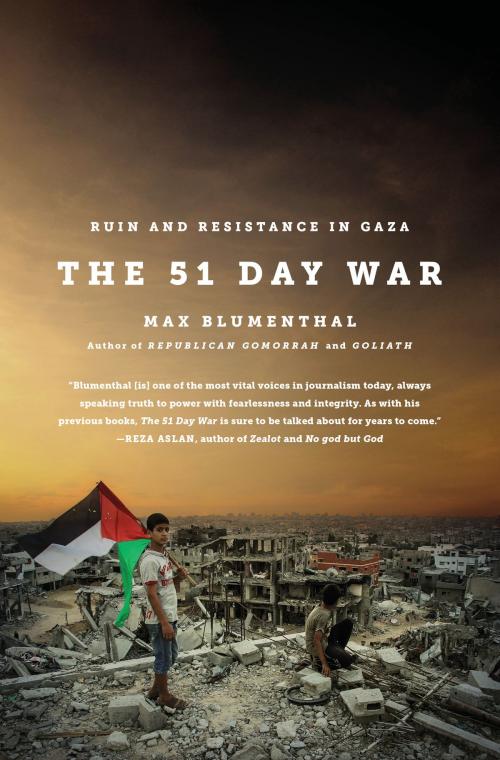The 51 Day War
Ruin and Resistance in Gaza
Nonfiction, History, Middle East, Israel, Social & Cultural Studies, Political Science, International| Author: | Max Blumenthal | ISBN: | 9781568585123 |
| Publisher: | PublicAffairs | Publication: | June 30, 2015 |
| Imprint: | Bold Type Books | Language: | English |
| Author: | Max Blumenthal |
| ISBN: | 9781568585123 |
| Publisher: | PublicAffairs |
| Publication: | June 30, 2015 |
| Imprint: | Bold Type Books |
| Language: | English |
On July 8, 2014, Israel launched air strikes on Hamas-controlled Gaza, followed by a ground invasion. The ensuing conflict led to 51 days of war that left over 2,000 people dead, the vast majority of whom were Palestinian civilians. During the assault, at least 10,000 homes were destroyed and, according to the United Nations, nearly 300,000 Palestinians were displaced. Max Blumenthal was on the ground during what he argues was an entirely avoidable catastrophe. In this explosive work of reportage, Blumenthal reveals the harrowing conditions and cynical deceptions that led to the ruinous war - details that slipped through the cracks of the mainstream media.
Here, for the first time, Blumenthal unearths and presents shocking evidence of atrocities he gathered in the rubble of Gaza after much of the Western media had packed up. He radically shifts the discussion around a number of controversial issues, like the use of civilians as human shields by Israeli forces; the arbitrary targeting of Palestinian civilians; and widespread incitement to genocide by Israeli military personnel, political leaders, and state-sponsored clerics. Blumenthal recorded testimonies from scores of Gazan residents, documenting potential war crimes committed by the Israeli armed forces. He also documented details of the battles that took place between Israeli forces and the armed guerrilla factions of the Gaza Strip, explaining their military and political significance with intimate proximity to the subject. And he explains the outcome of the ceasefire agreement that arrived after 51 days of fighting, showing how US and Egyptian-led diplomacy makes another, even more horrifying war almost inevitable.
The horrors the world witnessed in Gaza, Blumenthal argues, did not occur in a vacuum. They are reflections of the political trajectory of the state of Israeli society today. Here, Blumenthal demonstrates that while residents of Gaza are indeed victims who suffer immensely, they also engaged in dramatic acts of resistance. The 51 Day War exemplifies the fearless reporting and unflinching style that Blumenthal has become known for.
On July 8, 2014, Israel launched air strikes on Hamas-controlled Gaza, followed by a ground invasion. The ensuing conflict led to 51 days of war that left over 2,000 people dead, the vast majority of whom were Palestinian civilians. During the assault, at least 10,000 homes were destroyed and, according to the United Nations, nearly 300,000 Palestinians were displaced. Max Blumenthal was on the ground during what he argues was an entirely avoidable catastrophe. In this explosive work of reportage, Blumenthal reveals the harrowing conditions and cynical deceptions that led to the ruinous war - details that slipped through the cracks of the mainstream media.
Here, for the first time, Blumenthal unearths and presents shocking evidence of atrocities he gathered in the rubble of Gaza after much of the Western media had packed up. He radically shifts the discussion around a number of controversial issues, like the use of civilians as human shields by Israeli forces; the arbitrary targeting of Palestinian civilians; and widespread incitement to genocide by Israeli military personnel, political leaders, and state-sponsored clerics. Blumenthal recorded testimonies from scores of Gazan residents, documenting potential war crimes committed by the Israeli armed forces. He also documented details of the battles that took place between Israeli forces and the armed guerrilla factions of the Gaza Strip, explaining their military and political significance with intimate proximity to the subject. And he explains the outcome of the ceasefire agreement that arrived after 51 days of fighting, showing how US and Egyptian-led diplomacy makes another, even more horrifying war almost inevitable.
The horrors the world witnessed in Gaza, Blumenthal argues, did not occur in a vacuum. They are reflections of the political trajectory of the state of Israeli society today. Here, Blumenthal demonstrates that while residents of Gaza are indeed victims who suffer immensely, they also engaged in dramatic acts of resistance. The 51 Day War exemplifies the fearless reporting and unflinching style that Blumenthal has become known for.















